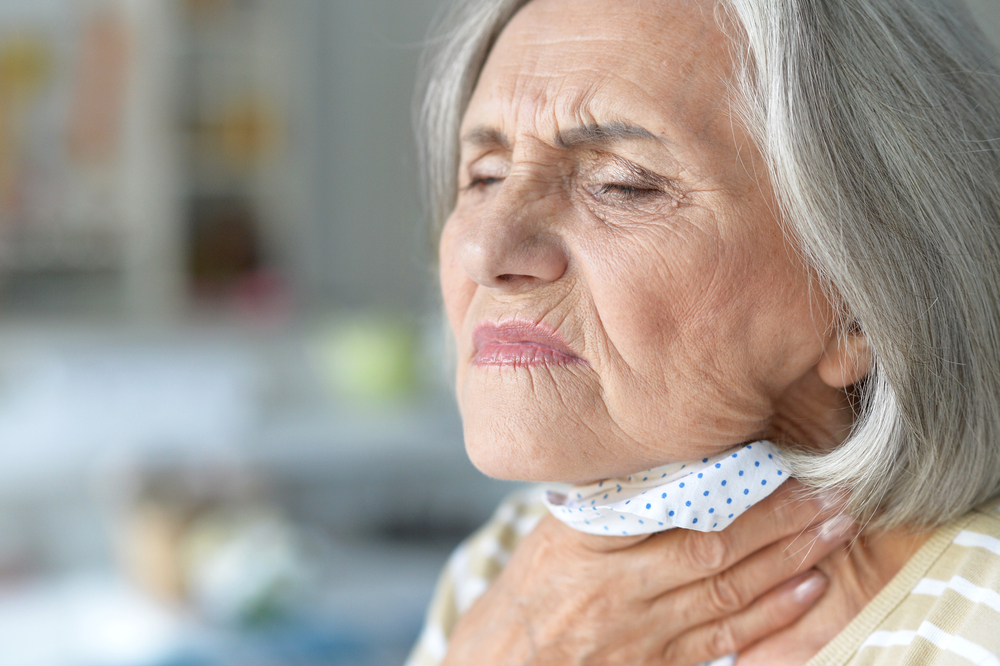Signs of Choking in Elderly Adults
Category:

According to Injury Facts, choking is the fourth leading cause of unintentional injury death, with death rates increasing rapidly starting around age 71. This statistic naturally leads us to ask: Why do we choke more as we age? Understanding this risk is vital for those caring for aging loved ones. In this blog post, we’ll explore the signs of choking in the elderly and offer practical guidance to ensure their safety and well-being.
What is the Most Common Cause of Choking in Older Adults?
Choking incidents among seniors often stem from challenges related to swallowing, a condition known as dysphagia. Several factors contribute to this issue in older adults. Dental problems, like missing teeth or ill-fitting dentures, hinder proper chewing. Muscle weakness, due to aging or medical conditions, affects the swallowing process. Neurological conditions disrupt muscle coordination for swallowing. Some medications have side effects like dry mouth that impact swallowing. Underlying health issues, such as GERD or esophageal strictures, can cause esophageal irritation or narrowing, increasing the risk of choking.
What are the Signs of Choking in the Elderly?
Choking incidents can be a serious concern for elderly individuals and can lead to life-threatening situations. Therefore, it’s important to know the signs of choking to ensure their safety. Below is a list of signs that can help you identify when someone is choking and respond accordingly:
Panic: Elderly individuals who are choking may exhibit a noticeable look of panic on their faces. This panic is often a result of the sudden and distressing sensation of not being able to breathe.
Clutching the Neck: They might instinctively reach for their throat with one or both hands. This action is an instinctive response to the discomfort and feeling of obstruction in the airway.
Wheezing or Odd Noises: Choking can cause wheezing or unusual noises originating from the throat. These sounds are typically due to the partial blockage of the airway, which restricts the flow of air and can produce raspy or gurgling sounds.
Inability to Speak: Choking can render an elderly person incapable of vocalizing their distress or calling for help. They may attempt to speak but find it extremely difficult or impossible to produce words due to the blocked airway.
Coughing Difficulty: Elderly individuals may struggle to cough effectively when choking. Their attempts to clear the airway through coughing might be weak, unproductive, or accompanied by pain.
Breathing Difficulty: Choking significantly impairs the ability to breathe. Elderly people who are choking may gasp for air or have difficulty taking in any breath at all. This can lead to rapid breathing or shortness of breath.
Download Our FREE Home Safety Guide for Seniors
What to do When Choked by Food
If the person can cough, speak, or breathe, encourage them to keep coughing. Sometimes, a forceful cough can dislodge an object. If it appears that no air is getting through, perform a series of back blows and abdominal thrusts to expel the object.
If you are alone and choking, you can perform the technique on yourself by thrusting your abdomen against the back of a chair or the edge of a counter to try to dislodge the object and clear your airway.
What to do After Choking on Food
Follow up with a health care professional after any choking episode. Damage to the airway could have occurred. Persistent coughing, drooling, wheezing, or trouble swallowing following a choking incident could be a sign of a serious condition such as the aspiration of particles into the lung, or aspiration pneumonia. A doctor must be consulted to treat this condition.
How to Prevent Choking in the Elderly
When it comes to preventing choking in the elderly, a few precautions can make all the difference. Encourage seniors to take smaller bites and savor their food, allowing ample time for chewing. It’s essential to be mindful of any denture problems, as well as to stay hydrated to ensure a smoother swallowing process. Additionally, remind them to sit upright while eating, as this aids in proper food passage and minimizes the risk of choking. By paying attention to these simple steps and fostering a relaxed dining environment, you can help ensure that your loved ones enjoy a safe and delightful holiday season.
Subscribe
Date: 2023-11-28
Category:


